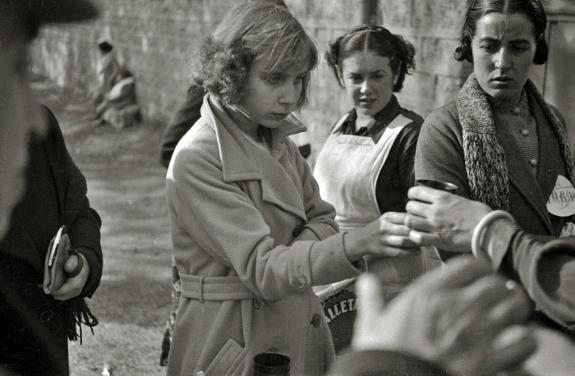

Sections
Highlight

ANA VEGA PÉREZ DE ARLUCEA
Friday, 27 July 2018, 12:52
Compartir
It is now 82 years since Colonel Seguí started an uprising in Melilla against the government of the Second Republic and led to the Spanish Civil War. Three generations later the consequences of his actions are still with us: it seems that almost every day articles in the media give information about that conflict, or demand restitution for its victims.
Less attention, however, is paid to the way people ate during the war: this may be considered by some as a frivolous aspect, or one which is less politically important, but it had an enormous repercussion for the population, ranging from forced seizures of food to deaths from malnutrition, and of course a long period of rationing. Those sad ration books, for families or individuals, were used right up until 1952, so I dare anyone to tell me that 16 years of rumbling stomachs don't have a story to tell.
Whether because of obligatory rationing (first decreed by the Republicans in 1937 and then adopted by Francoism), or due to lack of supplies, the point is that the Spanish people suffered severe hunger during the war years, and even more so afterwards. As a result, there was looting and an active black market, and dreams of roast chicken became (forgive the pun) our daily bread, much more than the inedible loaves made with millet and corn or the terrible porridge made with white vetch. The latter, a survival food in the worst periods of Spain's history, even caused an epidemic of athyrism in the 1940s, when it was still used even though it had already caused havoc before, during the War of Independence.
All this meant that people needed some type of guide about what to eat, what not to eat, and how to prepare the dishes, at least to give a hint of flavour to the disgusting ingredients.
Therefore, several books were published. Famous chefs, feeling they had a responsibility in the situation in which they had found themselves, rolled up their sleeves and set to work so that meals, although meagre, could be tasty and healthy. One of them was Joan Vila i Gelpí (1882-1958), a Catalonian chef who had trained in the best restaurants in Paris, London and Madrid and who was commissioned by the Catalan government to write two books for hard times: 'Menús de guerra', or 'Wartime menus', containing simple dishes made with the products which were still available in bombarded Barcelona, and 'El menjar en temps de guerra', meaning 'Food in times of war', which gave nutritional advice and guidance on how to recognise the symptoms of different illnesses.
Also involved in the battle against hunger was a lawyer, politician and gastronomic expert from Alicante, José Guardiola y Ortiz (1872-1946). Using a pseudonym, in 1938 he printed two booklets of recipes called 'Platos de guerra', or 'Wartime dishes'. The first one, about sardines, said that "war brings with it deprivations and sacrifices, food being not the least important of them, and a duty of patriotism means we need to endure this, and try to make things as least difficult as possible."
The second volume, about traditional Alicante cuisine, recommended contributing food to the war effort, and if that were not possible, to at least try to "eat everything with gusto, because every type of food is satisfying and nutritious if it is seasoned in a way which excites the appetite." Voluntary fasting, food donations and one dish per meal were some of the recommended ways of ensuring that there was enough food to supply those fighting on the fronts during the Civil War.
However, without a doubt one of the most influential figures on the food scene in wartime was Ignacio Doménech Puigcercós (1874-1956), a very famous chef and the author of numerous recipe books. Accustomed to truly delicious food, he faced a serious challenge in the Barcelona of 1937 and 1938. In his book 'Cocina de recursos' (Cooking with few resources), published in 1941, he talked about the terrible time when the city lacked supplies and how people often used to talk about fantastic meals they had enjoyed in the past.
Apologising for not being able to offer his readers his usual haute cuisine recipes, Doménech described the book as a way of using the imagination during a time "when we lacked just about everything".
He often used to dream of waking to "the delicate fragrance of a potato omelette, made with two recently laid eggs, roasted lamb or chicken, ham, grilled steak, and a 1,000 other delicacies" which once passed through his hands in great abundance. However, he thought up recipes such as egg-free omelette (made with flour and water), potato-free chips (with orange peel), sauces with no oil, macaroni with breadcrumbs, rice cutlets, flower croquettes, fried squid with no squid (onion rings, in fact), simulated butter and coffee made with peanut shells. And now, let us all send up a word of thanks to heaven that we can think of these dishes as a horror which occurred in the past.
Publicidad
Publicidad
Publicidad
Publicidad
Reporta un error en esta noticia
Necesitas ser suscriptor para poder votar.